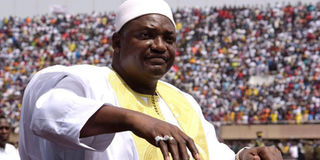Gambians begin voting in first post-Jammeh poll

Gambian President Adama Barrow looks at the audience from the opened roof of a car as he arrives at the Independence Stadium in Bakau on February 18, 2017. Gambians have voted in the first election since long-time leader Yahya Jammeh left power. PHOTO | SEYLLOU | AFP
What you need to know:
- There is no formal opinion polling in the tiny west African nation, making it difficult to establish voting intentions.
- Chief EU observer Miroslav Poche told AFP that the IEC had shown its impartiality under pressure by standing up to Jammeh when he lost the vote.
BAKAU
Gambians voted Thursday in the first election since long-time leader Yahya Jammeh left power, with several parties vying to enter parliament after 22 years of effective one-party rule.
Voting kicked off at 8am (0800 GMT) with dozens queueing beforehand at roadside polling stations, but participation appeared to have dropped by midday.
More than 880,000 Gambians are eligible to vote and polls are open until 5pm.
"We just hope that the voter turnout increases," said Manneh Sallah, vice-chairman of the Independent Electoral Commission (IEC), and EU observer Maria Arena, from Belgium, too told AFP that after a busy start "turnout is a little low".
NEW GOVERNMENT
The first results are expected during the evening and a full set by late morning on Friday.
The poll is a key test for several former opposition parties that united to form a coalition in December to oust Jammeh from power and deliver flag-bearer Adama Barrow to victory as the new president.
Internal tensions mean those parties are not running together in Thursday's legislative polls.
As a result nine parties are in competition, including Jammeh's Alliance for Patriotic Reorientation and Construction (APRC) and the strongest traditional opposition force, the United Democratic Party (UDP).
"Gambians are coming out to complete the establishment of a new government," said UDP leader Ousainou Darboe, who serves as foreign minister in Barrow's coalition cabinet.
"I'm not worried about any party but I'm also not underrating any party," he added.
OPINION POLLING
Posing a threat is the Gambia Democratic Congress (GDC), a youth-led party which did not join the governing coalition, and whose leader Mama Kandeh came third in last year's presidential poll.
There is no formal opinion polling in the tiny west African nation, making it difficult to establish voting intentions, but the scarcity of APRC rallies, which once dominated the campaign scene suggests voters are unlikely to give them the near-total majority seen in past elections.
Anna Stelle, 69, a former APRC supporter, said she had switched to the GDC, along with many other former Jammeh followers.
"I voted GDC," she told AFP. "I will never vote for APRC again and the other is UDP, I am not comfortable with them," she added, calling the UDP "tribalist" troublemakers.
There are 53 seats up for grabs in The Gambia's National Assembly, five more than in 2012.
OBSERVERS
Five extra places are appointed by the president to give a total of 58 seats in the legislative chamber, which was long derided as a rubber stamp for Jammeh's executive orders.
Alagie Bubacar Jallow, an unemployed hotel worker, said his town had long been ignored by the Jammeh regime because it was seen as an opposition stronghold.
"We need things to be done in Bakau," he told AFP. "I'm voting for Assan Touray, UDP, but more for the candidate. He is loyal, ambitious and respectful of all the people. He can try and fight for the needs of the town."
The African Union, regional bloc ECOWAS and the European Union have all sent observers to monitor voters casting their ballots in The Gambia's unique system, where marbles are dropped into coloured metal barrels representing different candidates.
POLLS COMMISSION
Chief EU observer Miroslav Poche told AFP that the IEC had shown its impartiality under pressure by standing up to Jammeh when he lost the vote last year and filed legal action against the body.
"The IEC has proved itself during the December 2016 presidential elections," he said, but added that the marble drum system was a "big challenge" for his technical support team.
It is the first time the EU has sent a fully-fledged observer mission to The Gambia, and it has bankrolled the vote at a time when state coffers are almost empty.
West African troops remain in The Gambia three months after Jammeh's departure, and will stay until Barrow is satisfied that security service reforms have removed rogue elements.
INEXPERIENCED LEADERS
Experts say that while the result could go feasibly in any direction, the relative novelty of a truly democratic election might fail to produce the unified front required to carry out the comprehensive overhaul of the state promised by Barrow.
"Given Jammeh's stranglehold over Gambian politics for the past 22 years, the country's opposition parties are inexperienced to the democratic process and relatively weak institutionally," said Joseph Siegle, director of research at the US-based Africa Center for Strategic Studies.





